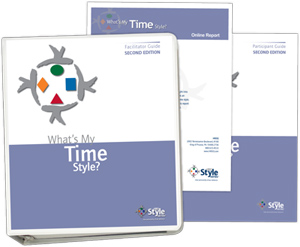 WHAT'S MY TIME STYLE? ASSESSMENT
WHAT'S MY TIME STYLE? ASSESSMENT
What’s My Time Style is a self-assessment for management development training that helps individuals to understand their personal style of time management, learn how to manage their time more efficiently, and work more productively with people who manage their time differently.
From beginning new projects and handling interruptions to multi-tasking and participating in meetings, time management skills have a huge impact on organizational productivity and efficiency. And just as individuals are unique, how people choose to manage their time also varies from person to person. One person may like to work alone slowly and methodically, yet another may procrastinate until the last minute to get work done. It’s all a function of the individual’s behavioural style. The secret is for individuals to understand their personal style so that they can complete work easily, and in a manner that’s comfortable and natural.
What’s My Time Style is a quick and easy-to-use tool for identifying personal time management style. Based on the proven personality theories of Marston and Jung, the self assessment measures an individual’s preference for one or more four basic behavioural styles: Direct, Spirited, Considerate and Systematic. With this knowledge, individuals learn how to make their style work to their advantage and better understand how to work with others who manage their time differently.
Learning Outcomes
- Identify personal time management style
- Learn how to capitalize on time management strengths
- Understand how to avoid potential time management trouble spots
- Improve interactions with others who have different time management styles
Theory and Development
The power behind What’s My Time Style and the HRDQ Style Series products lies in the simple but effective model for understanding human behavior. Based on the proven personality theories of Marston and Jung, the model identifies two basic dimensions of personal style: Assertiveness and Expressiveness. Assertiveness is the effort a person makes to influence or control the thoughts or actions of others. Expressiveness is the effort that a person makes to control his or her emotions and feelings when relating to others. Combining the two dimensions results in a four-quadrant model with four unique personal styles: Direct, Spirited, Considerate, and Systematic. The simplicity of the HRDQ Style Model is easy for trainers to facilitate and memorable for individuals to apply.
Uses for the Assessment
What’s My Time Style is appropriate for anyone to use for both personal and management development. The assessment can be used as a standalone training assessment, or it can be incorporated into a more comprehensive time management, meetings, project management or facilitating.
How It Works
What’s My Time Style starts with a 21-item self assessment that takes approximately 10 minutes to complete. Individuals choose the statement ending that most closely reflects the way they manage time. Scoring the assessment reveals a “My Time Style Profile” and a dominant preference for one or more four personal styles: Direct, Spirited, Considerate, and Systematic.
If you are planning to use What’s My Time Style in a classroom training session, we recommend you allow approximately 1 hour for interpretation of scores, topic discussion, debrief, and action planning. The What’s My Time Style Facilitator Guide includes everything you need to lead a successful training session from comprehensive background information and activities, to reproducible handouts and even a professional PowerPoint presentation. The Facilitator Guide also offers an easy-to-follow workshop outline that expands What’s My Time Style into a 3.5-hour programme.
What to Order
What’s My Time Style is available in both Online and Print Versions.
The Online Version is an excellent choice for enterprise-wide training or audiences that are geographically dispersed. It offers 24/7 access, streamlined distribution, and instant scoring. Each Online Assessment includes personalized reporting, full-colour charts, interpretive information, worksheets, and action planning.
The Print Version is ideal for facilitators who prefer to oversee scoring and administration of the assessment, if you don’t know who the participants will be before the class begins, or if your learners do not have easy access to computers. Includes pressure-sensitive forms for scoring to aid manual tabulation. The accompanying Participant Guide includes interpretive information, worksheets, and action planning.
You will need to order a Facilitator Guide per trainer and either 1 Print Participant Guide or 1 Online Assessment for each individual learner. Additional Participant Guides or Online Assessment credits may be purchased separately.
Each time you administer the assessment you will need to order a new Print or Online Assessment for each individual. Additional Facilitator Guides are also available for individual purchase if you have additional trainers or require a new copy.
Time Required: 10 minutes
Author: Mary Blitzer Field, MA